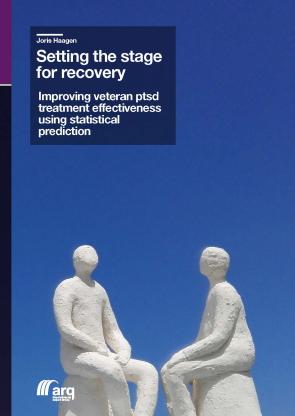Setting the stage for recovery
Improving veteran PTSD treatment effectiveness using statistical prediction - Thesis Joris Haagen (2017)
In 2017, senior researcher and policy advisor Joris Haagen received his PhD for his study of the ability to explain the effectiveness of psychotherapy through statistical prediction. Which veterans do recover with PTSD treatments and which do not?
Since 1940, more than half a million Dutch veterans have participated in nearly 100 war and peacekeeping missions. These veterans operated under very difficult conditions that placed them at the forefront of human violence and tragedy.
Despite exposure to distressing and life-threatening events, veterans are resilient. The majority reflect positively on their deployment. However, some veterans develop persistent psychological symptoms, resulting from traumatic experiences.
Veterans and PTSD
Post-traumatic stress disorder (PTSD) is the most common deployment-related psychological disorder among veterans. Veterans with PTSD are difficult to treat; psychotherapeutic interventions have limited effectiveness. Much is still unknown about how PTSD psychotherapy works. Why do some veterans recover while others do not?
PTSD treatments often too one-sided
This thesis identifies factors that influence and predict the outcome of PTSD treatment. There do appear to be effective treatments for PTSD, but they are often too one-sided. For some veterans, treatments do not work at all or only partially. Taking the identified factors into account could enable the development of more tailored and effective interventions for veterans. The thesis shows how predictive research can bridge the gap between science and practice to increase the likelihood of recovery for veterans with PTSD.

Downloads
Author
Publisher
ARQ National Psychotrauma Centre
